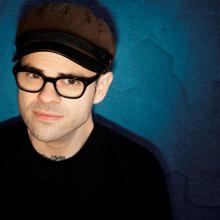Depression
Alexander was having a terrible, horrible, no good, very bad day.
It's a children's story. I know. A no good, very bad day ... how do you prepare your kids for that kind of day where nothing seems to go right, where at every turn knobs break and we step in puddles and get gum stuck in our hair?
Maybe, we tell ourselves, that we can move to Australia and everything will be better.
Well, no. Terrible, horrible, no good, very bad days happen there, too. They happen everywhere. Everywhere. It's a great book.
So what do we do about them? The classic children's book doesn't answer the question for us. Not really. It's just a little bit of truth telling with fun illustrations. Some days are just terrible, horrible, no good, very bad days.
But as we grow older, we learn that though these days do simply happen, that there are attitudes one can have, there are approaches to these days one can take.
The most precious place on Earth for me is a camp on a lake in the Adirondack Mountains of New York. During the next century, climate change will chase northward things that I cherish. Spruce, tamaracks, sugar maples, balsam fir, moose, mink, and loons will no longer grace the shores and waters of that lake. Like most people in northern climes, I see the changes happening already. I have to fight hard against despair, for my personal losses, yes, but also for the universality and injustice of the calamity, which already affects so many of the poor and innocent.
WHY IS IT so hard for people to respond effectively to the reality of climate change?
Changing people’s minds—with facts, tables, and predictions—has proven extremely difficult. Even showing people the miraculous beauty of the planet alongside the predicted losses is not working. Guilt, anxiety, and anger can be motivating forces, but they have debilitating side effects: They are all soul-destroying.
So I wonder about our hearts. Have we ignored our emotional and spiritual connections to the planet? Could the noise swirling around climate change—science, politics, media blitzes, as well as the weather disasters themselves—drown out the voice of a loss so profound that it rests unnamed in our souls? Could our breaking hearts be part of the reason we are immobilized?
In the 1960s, Rachel Carson’s image of a “silent spring” due to the proliferation of pesticides was as heartrending as it was controversial. Carson was ridiculed, her predictions dismissed. The corporate world paid millions to have her silenced. But eventually the love of bird songs won out. People read Carson’s book, grieved at the prospect of a silent spring, spoke up, and insisted the chemical-company-supported politicians ban DDT.
Each year 90,000 parents in the U.S. confront the profound suffering that follows the death of a child or adolescent.
Some of those rely on faith to help them through their grief. Others look to psychiatrists, who offer therapy or prescribe antidepressants to help ease their patients’ pain.
On Saturday, in a move that could add to the tension between religion and science, the American Psychiatric Association changed a controversial diagnosis regarding how grief relates to mental health.
The change “will affect every single person in the country, because at some point we’re all going to be bereaved,” said Joanne Cacciatore, founder of the Center for Loss and Trauma in Phoenix and a professor of social work at Arizona State University.
At issue are questions as fundamental as how long we grieve, what clinical label we assign to sadness, and when grief transforms into mental illness.
The modification also rekindles long-standing debates about whether spirituality or medicine offers the best pathway out of bereavement.
The Rev. Frank Page, former president of the Southern Baptist Convention, was getting ready to work in the yard in the fall of 2009 when the phone rang. His daughter was on the line.
Daddy, I love you, she said. Tell Mama and the girls I love them, too.
Then she was gone.
Melissa Page Strange, 32, took her own life just after hanging up the phone with her dad.
“I do not want you to imagine what that is like,” he said.
For years, Page did not share the painful details of Melissa’s death, fearing that some Christians might speak ill of her if they knew. Mental illness and suicide were taboo topics for many churches, seen as a kind of spiritual failure.
But that may be starting to change.
The day Franklin Graham was born, he received a telegram.
“Welcome to this sin-sick world,” the Western Union message said, “and to the challenge you have to walk in your daddy’s footsteps.”
It didn’t take long for Graham, the son of famed evangelist Billy Graham, to realize that being a preacher’s kid would be both a blessing and a burden.
“I love my parents,” Graham said in a recent interview, “but there came a time where I couldn’t let my parents live my life.”
A new year evokes so many emotions in us. For some a wonder of potential opportunities. Others, the hope of change. Still others, the fear of uncertainty. In each case there lies a moment of suspense. A pause. And yet our resolutions are spoken, written and relayed far before the time has been taken to contemplate what we feel and how we feel.
This year my challenge is to start with the place of inaction and pause to consider what we in fact feel. To each of us we have to slow down after the Christmas season high of purchasing, giving, praying, lighting candles, waiting in Advent, and hoping for the Christ Child to know what kind of year we will encounter.
Resolve to be irresolute until the time of knowing appears.
Resolve to sit silent and listen.
Resolve to move slower until weary legs are refreshed.
Resolve to know loved ones as they are right now.
Resolve to build, to grow, to transform those parts that 2012 has damaged or left broken.
Across five states and 20 years, on the couch at the psychoanalyst’s, wadded Kleenex in my hands, and kneeling on the marble floor of the confessional, incense curling through my hair, I sorted through the jagged prisms of experience that, as a child, I did not understand: What it means to be in the constant presence of someone who does not look you in the eye, who lives beyond the bar of constant preoccupation.
I didn’t understand then the tiresome vigilance I’d develop as a result—the almost unconscious, constant mental sorting to see if, at that moment, I was OK, or if others were about to abandon me forever—a reaction I’ve heard is common among children of alcoholics, and which I’ve seen myself in the needy inner-city children I have taught.
Along the way, I discovered that the seed of my mother’s sadness had been there all along, from my earliest memory, well before my father died. And by the time I was a toddler, the seed had germinated in me, too.
As I lay on the kitchen floor -- my body rocking with sobs, my mouth telling my husband, "I hate my life" -- it never occurred to me to pick up the phone and call a friend.
To tell someone about the life I was living, in which over the last few years rug after rug kept getting pulled out from under me -- my parents divorced, my husband's business tanked, our debt rose, health issues loomed, and our marriage sagged under the weight of it all -- was not something I was wired to do.
In fact, I was mortified when my husband rounded the bend and saw me there, sprawled out on the tile, weeping. Crying and hurting is something I do best alone.
Awesome people. Vegetarians. Going mute. Here's a little round up of links from around the Web you may have missed this week:
- Awesome people hanging out together.
- An alternative to abortion.
- Take a walk in Milan.
- Are you a new vegetarian? Some tips.
- Tom Hanks addresses Yale graduates.
- Kathy Khang shares more about her experience with depression.
- Simple and powerful: forgive.
- Don't you sometimes wish you could just hit the mute button?
- Sojourners' Enuma Okoro on Pentecost:
"Pentecost is God's 'show-and-tell' lesson that after the incarnation no one people has a purchase on the fullness of God. No single denomination, no one race, no one ethnicity, and no one socioeconomic group mediates God's fullness to the world. Diversity is an essential attribute of a Spirit-filled church (Acts 2:8,18)."
Here’s a little round up of links from around the Web you may have missed this week:
- School lunches from around the world.
- Imagine an America in which all-female families survived the depression.
- Sheryl Sandberg, COO of Facebook, on Why Women Should Be In Charge.
- Speaking of commencement speeches, here are excerpts from Aron Ralston’s speech at my alma mater: “May your boulders be your blessings.“
- Fresh out of college, women still make less than men.
- Saudi women driving in protest.
- Withdrawal from Afghanistan gains congressional support.
- Want to work at Sojourners?
The captain was the first to smell it. He told us that the ocean didn't used to smell this way. Then, we all smelled it.






